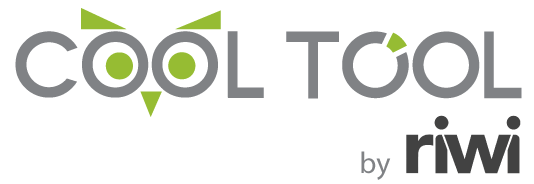By: Catherine Barker, Mercedes Fogarassy, Tala Khaki, Leah Moncada, Tianshuo Yang, Danielle Goldfarb, and Rikki H. Sargent
For more information, please contact Sam Wollenberg: sam.wollenberg@riwi.com
- After the US withdrawal, seven in ten RIWI respondents in Afghanistan believed that their lives were currently at risk due to the Taliban.
- Over half reported that they had left or tried to leave their home as a result of the Taliban’s actions.
- Over 40 percent of respondents with school-aged female family members reported that those family members were not attending school, with the majority citing that girls were not allowed to attend or did not feel safe attending.
- Eight in ten respondents reported that their family financial situation deteriorated since the Taliban takeover.
Measuring citizen sentiment safely and anonymously
The withdrawal of military, media, and aid from Afghanistan compromises the international community’s ability to understand the extent of the crisis and develop targeted, data-driven interventions. Immediately after the Taliban takeover of Kabul, RIWI launched a study gathering real-time sentiment data safely and anonymously from those on-the-ground in Afghanistan, with the goal of starting to fill this data gap. The study provides benchmark data on citizen perceptions of safety, disruptions to education and work for girls and women, disruptions to basic services like banking and food, the impact on family finances, as well as other implications and insights.
RIWI employed Random Domain Intercept Technology to hear from over 12,000 individuals (15+ years old) in Afghanistan from Aug 27-Nov 1, 2021. This technology ensures that anyone surfing the Web has a chance of being exposed to the survey, regardless of device type (including mobile phones). Unlike typical surveys, this technology does not collect any personally identifiable information (e.g., email addresses), ensuring that respondents can answer safely, anonymously, and honestly. Participation in the survey cannot be traced, tracked, or identified on respondents’ devices. No incentives are offered (eliminating the possibility of incentive bias), and participants can exit the survey at any time. A full methodology statement that details Random Domain Intercept Technology is available here.
An average of 182 respondents opted-in to participate per day and respondents were reached from across all 34 Afghanistan provinces. The number of respondents per survey question ranged from 721 to 12,204 due to the following: (1) some questions were seen by a subset of respondents, (2) some respondents ended their participation early (of those who started the survey, 22 percent completed the entire questionnaire), and/or (3) some questions were added to the survey after the start of data collection, and thus had less time in field.
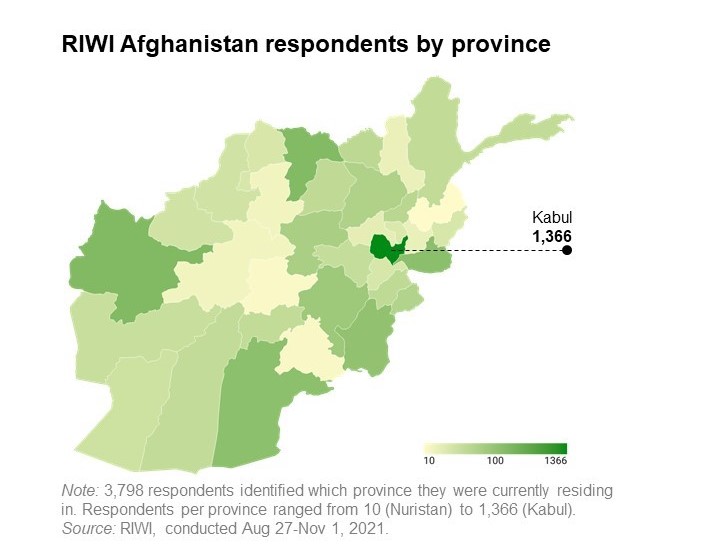
Citizen sentiment after the fall of Kabul
Girls and women in education and work
Girls and women face increased education and work-related restrictions under Taliban rule. Over 40 percent of RIWI respondents with school-aged female family members reported that those family members were not attending school. Of those, 41 percent reported that girls/women were not allowed to attend school in their area and an additional 29 percent reported that girls/women were allowed in school, but that it was currently unsafe for them to attend.
Over 60 percent of respondents reported that women were not able to work safely in their area, with 63 percent of those believing that it would remain unsafe for the foreseeable future.
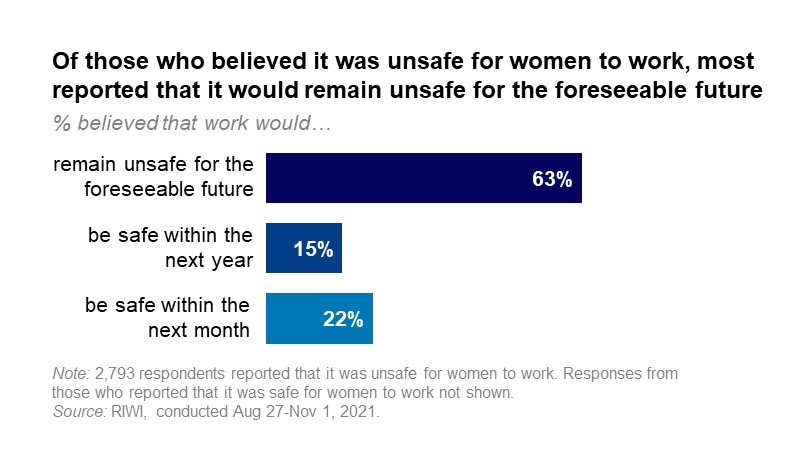
Displacement and migration
Many have reported on the extent of internal displacement and migration intentions since the Taliban takeover. RIWI found that over half of respondents left or tried to leave their home as a result of the Taliban’s actions. Of those who left or planned to leave, 95 percent reported that they would leave the country if they could. These behaviors and intentions are unsurprising considering seven in ten respondents believed that their lives were currently at risk due to the Taliban.
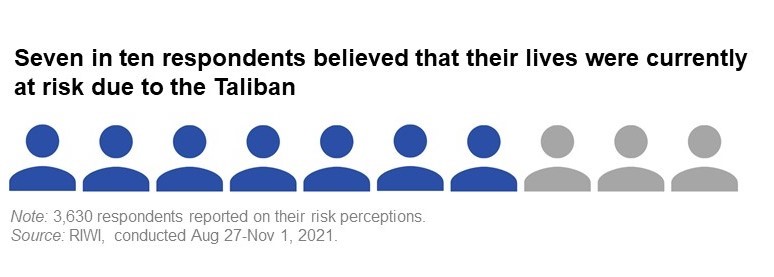
Worsening financial situation
Afghanistan’s economy is near collapse. By mid-2022, it is estimated that Afghanistan could approach an alarming 97 percent poverty rate. In line with other grim estimates, 80 percent of RIWI respondents reported that their family financial situation worsened a little or a lot since the Taliban takeover. The negative impact is persistent across demographic indicators (e.g., age group, gender), but especially prevalent among those living in the center or the suburbs of a large city (compared with those in smaller cities or rural areas). Moreover, the majority reported significant deterioration in their financial situation regardless of their living standards prior to the Taliban takeover of Kabul.
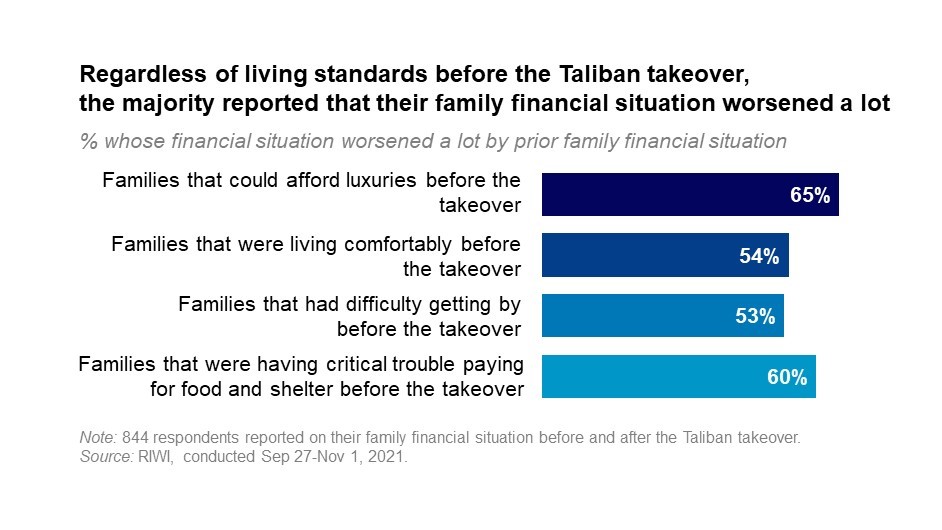
Disruptions to services
Many have called attention to disruptions to services in Afghanistan since the Taliban takeover, including disruptions to food, education, and healthcare. Over three quarters of RIWI respondents reported experiencing disruptions to services such as health care, education, water, food and basic household items. Three in ten respondents identified disruptions to banking and education. These disruptions for the most part remained consistent throughout the data collection period (e.g., 19 percent of respondents experienced disruptions to food and basic household items in Sep 2021, relative to 22 percent in Oct 2021).
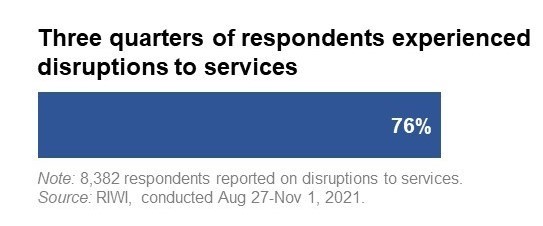
Summary and topline results
RIWI harnessed the capabilities of Random Domain Intercept Technology to monitor the ongoing crisis in Afghanistan. These data corroborate the disheartening qualitative stories and news reporting following the fall of Kabul to the Taliban. Indeed, many experienced disruptions to services and goods, including education and access to water and household items; a significant share of girls and women are not attending school or work; many feared for their lives, left their homes, or intend to leave their homes in the future. Monitoring these insights in real-time can shed light on the fast-changing state of the region, which in turn will help UN agencies, NGOs, and other humanitarian organizations better target interventions and support services. As the situation continues to unfold, these data can also be used as a benchmark to monitor such change, both negative change as the turmoil continues in the fragile region, as well as positive change as world-wide organizations come together to support those living in Afghanistan.
RIWI is looking for partners to extend this work on a quarterly / ongoing basis. For more information on this research and partnership opportunity, please contact us at ask@riwi.com
A PDF of full topline results are available for download.
